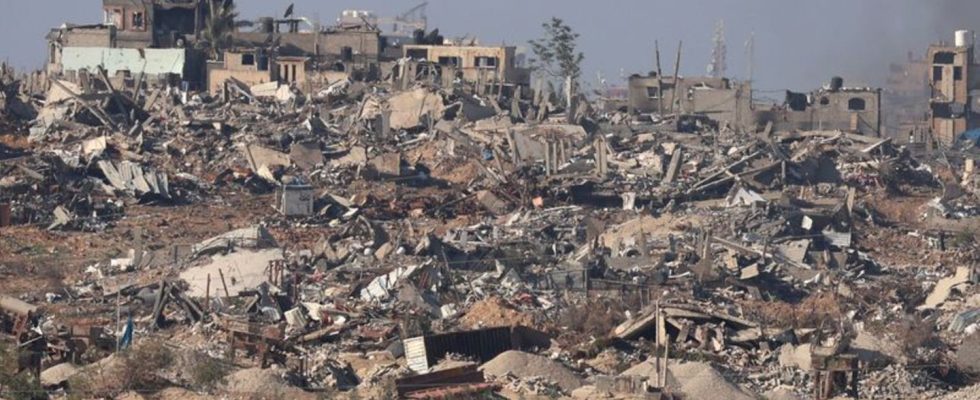War in the Middle East
Israel discusses time after Gaza war
There has been war between Israel and the Islamist Hamas in the Gaza Strip for almost three months. photo
© Gil Cohen Magen/XinHua/dpa
What will become of the Gaza Strip after the war? Who should be in charge? This is being discussed in Israel’s government. For civilians, there is still no end to the suffering in sight. The overview.
While Israel’s army fought the war in… Gaza Strip continues and aid organizations complain about inadequate supplies for civilians, the government is discussing the future of the bombed-out coastal area. Defense Minister Joav Galant sees the Palestinians as responsible for the area after the end of the war.
Prime Minister Benjamin Netanyahu is also pushing for a solution to the situation on Israel’s border with Lebanon, where there are repeated violent confrontations with the Hezbollah militia. Meanwhile, US Secretary of State Antony Blinken is expected to make another mediation visit to the Middle East today. It should be about more humanitarian aid for Gaza, the freeing of the remaining Hamas hostages and better protection for civilians in the conflict.
Defense Minister: Palestinians should take control
“There will be no presence of Israeli civilians in the Gaza Strip after the war objectives have been achieved,” Galant said Thursday. Some right-wing extremist ministers had previously spoken out in favor of repopulation by Israel after the end of the war. Germany, France and the USA sharply criticized the statements. According to Galant, local Palestinian actors who are not hostile to Israel should take control of the Palestinian territory. He left it open which actors these could specifically be.
Netanyahu insists on a solution on the border with Lebanon
Meanwhile, at a meeting with US envoy and mediator Amos Hochstein, Prime Minister Netanyahu insisted on a solution on the border with Lebanon so that residents evacuated from there can return. Israel prefers this to happen through diplomatic channels, Netanyahu said, according to his office on Thursday. This requires a “fundamental change” at the border. He did not say what this would look like in concrete terms. According to Israeli media, the country wants the Lebanese Hezbollah militia to completely withdraw its fighters from the border area.
Since the Gaza war began on October 7th after the Hamas massacre in Israel, the situation there has also become more serious. It is the worst escalation since the second Lebanon war in 2006. The regular shelling between the Israeli army and the pro-Iranian Hezbollah militia has already resulted in deaths on both sides, including civilians. The killing of a Hamas leader in Beirut on Tuesday, which Hezbollah blames on Israel, further fuels concerns about the conflict expanding. Hezbollah has ties to Hamas, but is considered more powerful.
The USA wants the Palestinian Authority (PA), which rules in the West Bank and is dominated by the Palestinian organization Fatah, to take back control of the Gaza Strip. Netanyahu is against it. Some representatives of the Fatah party expressed understanding for the Hamas massacre on October 7th in Israel. Hamas violently drove the PA out of the coastal strip in 2007. Fatah and Hamas are the two largest Palestinian organizations – and have been bitter rivals ever since. However, there have been reconciliation talks between the two for several years.
Israel begins new phase in Gaza war
Galant said that after the period of heavy bombardment, the army in northern Gaza would now move to a new combat approach. This includes targeted raids, the destruction of tunnels, ground operations and air strikes to combat “remaining sources of terror in the area”. The war will continue until all hostages are released and Hamas’ military and political leadership is destroyed. According to new information, the army currently believes there are still 136 hostages in the Gaza Strip.
UN complains about the humanitarian situation in the Gaza Strip
According to the UN emergency relief office OCHA, aid organizations have not been able to deliver urgently needed life-saving aid to the north of the Gaza Strip for days. OCHA said overnight that the UN and its partners were unable to deliver humanitarian assistance north of the Wadi Gaza River for four days as access to the areas was delayed or denied and fighting continued in the area . This included medication to supply more than 100,000 people for a month.
There has been a war between Israel and the Islamist Hamas in the Gaza Strip for three months now. The number of Palestinians killed has risen to 22,438, according to the Hamas-controlled health authority. The war was triggered by the October 7 massacre carried out by terrorists from Hamas and other groups in Israel. Around 1,200 people were killed.
Israel with another raid in the West Bank
Meanwhile, Israel’s military says it has ended a raid on the Nur Shams refugee camp in Tulkarm in the northwest of the West Bank after more than 40 hours. Eleven people were arrested in the anti-terror operation, the army announced on Thursday. What exactly they are accused of was not disclosed.
Hamas leader: Israel is digging its own grave
According to the former chairman of the Islamist Hamas, Khaled Mashaal, Israel is “digging its own grave” with its war in the Gaza Strip. The terrorist organization distributed Mashaal’s speech on Thursday evening. The reason was the killing of the deputy head of Hamas’ political bureau on Tuesday evening in the Lebanese capital Beirut. Mashaal accused Israel of extending its “aggressions” abroad “because they think it will break resistance.”
“The enemy also believes that by assassinating leaders, resistance will be broken and leadership weakened,” the Hamas leader said. “It’s a big illusion.” Whenever a leader leaves, a new one will emerge.

